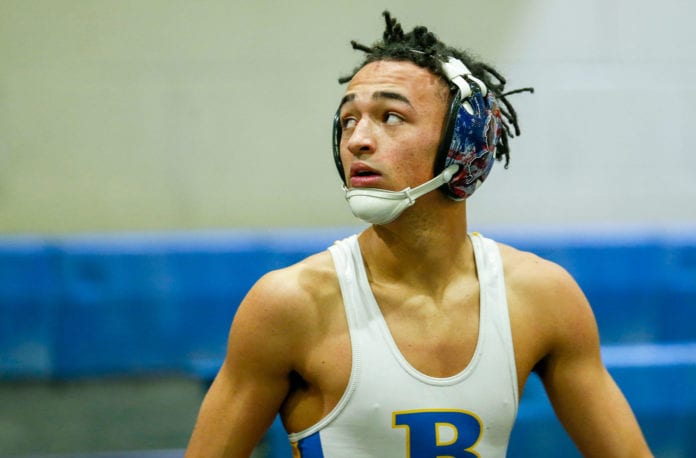By Jesse Washington, The Undefeated
When Andrew Johnson walked into The Line Up barbershop last April, all eyes focused on him. Since that awful day in December when a referee had forced the 16-year-old Buena Regional High School wrestler to either cut his dreadlocks or forfeit his match, he felt as if the world was constantly watching him, especially in his small New Jersey town. Watching and whispering about things beyond his control.
Yo, that’s that kid who got his locs chopped by the white ref.
Andrew, who goes by Drew, sat down in Mikey Morales’ chair. Morales has tended Drew’s hair since middle school. After a video of Drew’s shearing attracted a massive social media audience last December, Morales had reshaped Drew’s hair into shorter dreadlocks that radiated from his head.
But now Drew had a new problem. The night before, he had grabbed a pair of scissors from the kitchen and hacked at what remained of his dreads, then asked his little sister to finish the job. Drew loved his hair but was tired of it causing so much trouble. Tired of being treated differently and made into something he was not. Tired of looking in the mirror and seeing the referee, Alan Maloney, looking back.
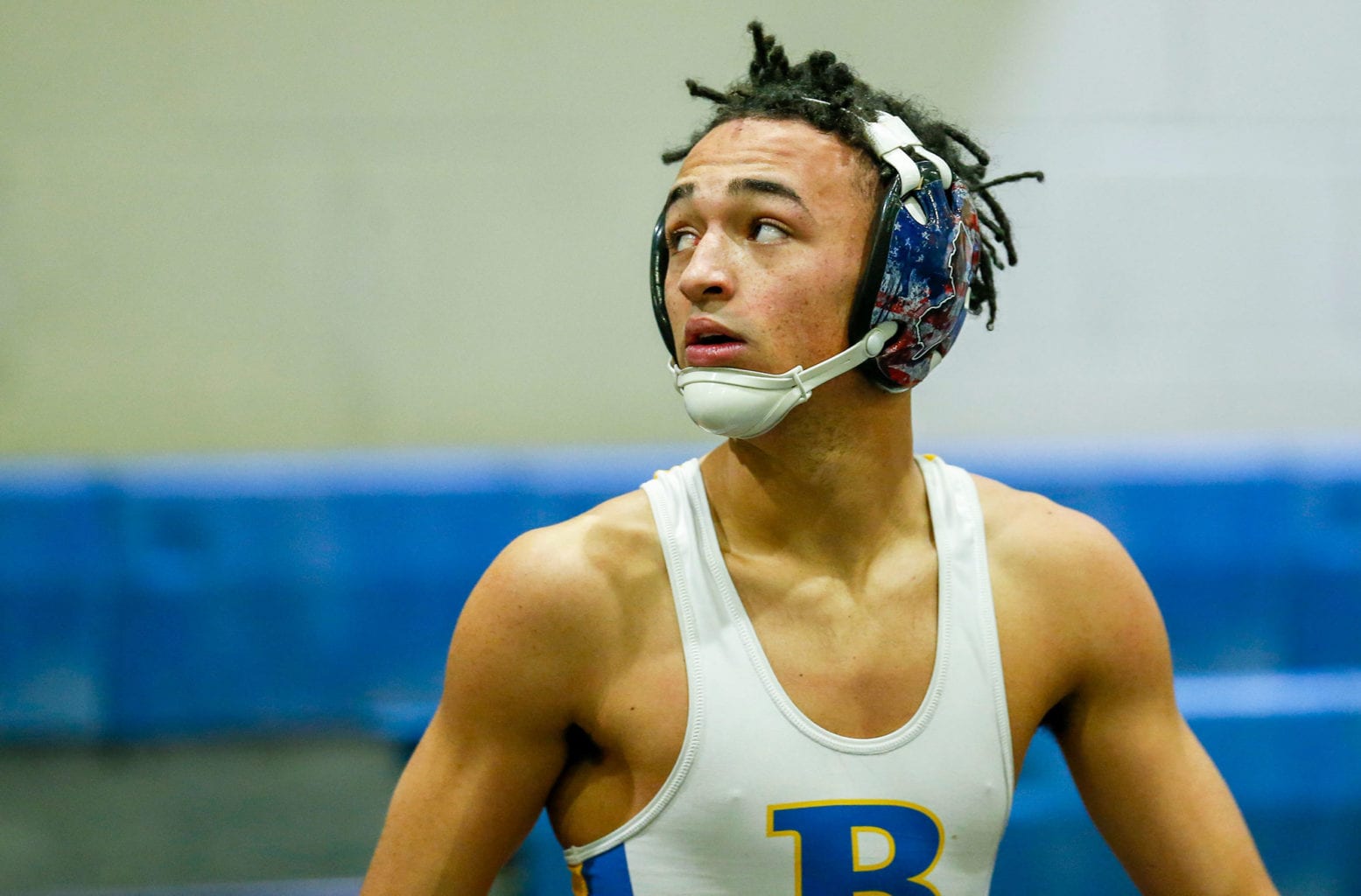
Maloney already had a racist incident in his past before telling Drew that his hair was “unnatural” and giving him 90 seconds to cut it. What resulted was far more than a humiliating haircut for one high school student. It became a shared and painful experience for many who see how issues of identity, subjugation, power and freedom are intertwined in African American hair.
Support for Drew poured in from celebrities, pro athletes and the governor of New Jersey. But others, including some of Drew’s schoolmates and other residents of his mostly white town, defended Maloney as simply enforcing the rules. Another local contingent believed that even if Maloney was wrong, Drew should have just shaken it off and moved on.
The shy, quiet teen was trapped in a suffocating bubble. Maybe those kitchen scissors were meant to let in some air.
The barber surveyed the damage and looked at Drew’s father, Charles Johnson III, who goes by his middle name of Sheridan. Sheridan and his three sons come to Morales once a week. Their hairstyles vary, but they always stay crisply edged and trimmed. The Johnsons are not a family who walks around looking jacked up.
The barbers and most of their clientele are Puerto Rican here at The Line Up, which is located in one of the strip malls dotting the South Jersey farmlands between Philadelphia and Atlantic City. Drew, too, is more Puerto Rican than anything else, despite being widely portrayed as strictly African American when his haircut entered the viral pantheon of American racial injustice.
During several trips to Buena Vista Township, and while attending several of the wrestling team’s home and away matches, I had in-depth conversations with Drew, his parents and siblings, close friends of the Johnson family and their attorney. I talked to Drew’s schoolmates, coaches, other members of the Buena community, and wrestlers and coaches from around South Jersey. The Johnsons declined to be interviewed on the record. Some of the descriptions of Drew’s emotions come from his attorney; others from people in Buena who interacted with him. Maloney declined an interview request, and his attorney didn’t respond to phone messages.
What I saw in Buena was a close-knit, mixed-race family crushed by our country’s tectonic conflict over racial justice and demographic change. This took place in a small town with a rich wrestling tradition where people say sports brings them together, even as they are further apart than most want to believe.
Watching the video of the match, I saw Maloney give Drew 90 seconds to shatter either a pillar of his identity or his bond with his teammates and his home. Sitting in the barber chair beneath Morales’ buzzing clippers 3½ months later, Drew was still trying to reassemble the pieces of who he used to be.
Hair is Africa’s most enduring marker in America, the phenotype most likely to persist through generations of interracial children. Hair is what black folks look at when trying to determine who is one of us. Many mixed-race people are not permitted to fully determine their own identity because of how the world insists on defining them. That’s when hair can represent a manifesto of self.
Sheridan Johnson is the son of a black father and a Puerto Rican mother. He looks black, grew up with his black grandparents and has always identified himself as black. His hair is cut close but dark on top, with a fade melting into his thick, impeccably groomed beard.
Sheridan’s wife, Rosa, has a Puerto Rican father and an Irish mother. Rosa has straight, shoulder-length brown hair and fair skin. She values her Puerto Rican heritage and maiden name of Santiago, but much of the world sees her as a white lady with black kids.
The four Johnson children are Drew, who is now 17, 13-year-old Cami, 15-year-old Nate and 19-year-old Matt. Each of their complexions is a different shade of brown. Their hair, too, varies in texture and degree of curl. Drew has the lightest skin, and freckles. He cultivated his dreadlocks in early 2018 by rubbing his hair nightly with a towel. Cami is the darkest, with caramel-colored skin and hair that, when I saw her, fell past her shoulders in cascading coils. Cami is the only sibling who sort of considers herself black. Her brothers never defined themselves that way. If pressed, the Johnson boys will break themselves down mathematically: 50% Puerto Rican, 25% black and 25% white.
Last December, Drew’s calculated identity went up in smoke. That’s when the world decided he was black.
Long, straight roads slice through the farms and woods of Buena Vista Township, 45 minutes southeast of Philly. Tractors creep through fields of tomatoes, peppers and corn. Farmers from Italy arrived in the mid-1850s because the sandy soil was good for grapes. The area remains heavily working-class Italian: Buena is pronounced “BYOO-nuh” because of how it was said by those from the old country. The census says 75% of the township’s 7,299 residents are white, 13% are Hispanic and 7.5% are black.
On Dec. 19, furrowed empty earth ran right up to the parking lot of Buena Regional High School, where the Johnson family gathered to watch Drew wrestle. It was not a special occasion. Where you see one Johnson, you often see them all.
The meet took place in the Charles Johnson Memorial Gymnasium, which is named after Sheridan’s grandfather, who was a beloved custodian at the school. The opponent was rival Oakcrest High. Buena had beaten Oakcrest eight years in a row, but this meet was expected to be close. They were the top two teams in the Cape Atlantic League’s National Division, so the division title was likely on the line. Every match would be crucial.
Wrestling has been part of the fabric of Buena since the early 1970s, when Mickey Caprese, who owned a greeting card store across from Buena’s junior high school, got a bunch of neighborhood kids together and started a youth program. Buena and wrestling are a good match. They’re both tough but not loud, small but proud. There’s no room for pretty boys. Scarred hands or cauliflowered ears are a mark of pride.
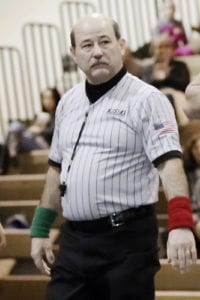
CREDIT: ELIZABETH ROBERTSON/PHILADELPHIA INQUIRER/NEWSCOM
“Wrestling’s not a sport you can just go out there and play,” said Castellari, who is still fit from daily workouts and tanned from running his family’s farm. “You have to put a lot into it just to win one match. You have to get a kid to buy in. You have to dedicate yourself and put in the time.”
Castellari’s son Eric wrestled for his dad and now volunteers with the Buena wrestling team. “Buena is not a participation trophy kind of place,” Eric said. “Other sports, there’s somebody next to you. This is one-on-one. If you mentally break, if you give up, you will be abused. Nobody can save you. There’s no safety over the top.
“Nobody realizes how hard those six minutes are.”
Five minutes and 30 seconds into the December match, blood dripped down Drew’s bottom lip. Cramps wracked both calves. He was losing 2-1 and trapped on his stomach underneath his opponent. The shock of having his dreadlocks cut before the match had given way to the desperation of trying to survive.
Drew is not the most talented wrestler in his family. That would be his younger brother, Nate, who started varsity as a freshman at 113 pounds. Drew didn’t join the varsity until his sophomore year, when his record was 13-12 with six pins. In some of the losses, he hit a mental wall and couldn’t climb over, one of his coaches told me. Drew let himself think he could not win.
Drew had big goals last season, his junior year, in the 120-pound division. It was cool having his brother on the team. Nate wouldn’t have to learn by getting abused on the wrong side of the wall.
Referees are supposed to handle hair and other issues at the pre-meet weigh-ins, but on that day Maloney was late. He conducted the “skin check” about 6:45 p.m., 15 minutes before the 7 p.m. start, according to a statement submitted to the school district by Buena’s head wrestling coach, George Maxwell. Maloney told Drew he needed to shave. After Drew returned from the locker room with no stubble, Maloney said he had “concerns” about Drew’s and Nate’s hair, according to the statement and the Johnson family’s attorney, Dominic A. Speziali.
Drew returned to the locker room to get a cap. Maloney left because the meet was about to begin. In the first match, refereed by Maloney, Nate wrestled without a cap and lost. Drew’s match came second.
When Drew was on the mat about to shake hands with his opponent, Maloney stopped him and said his cap was illegal because it didn’t attach to his headgear. Drew and his team did not have an attachable cap because they didn’t think it was needed. Drew had wrestled earlier that season without one.
New Jersey’s rules prohibit a wrestler’s hair from falling past his earlobes, shirt collar or eyebrows. But that was not Maloney’s issue with Drew. He cited a rule saying hair must be in its natural state.
“It’s unnatural,” Maloney told Drew and his coaches, according to a letter sent by Speziali to the New Jersey Division on Civil Rights, which is investigating what happened.
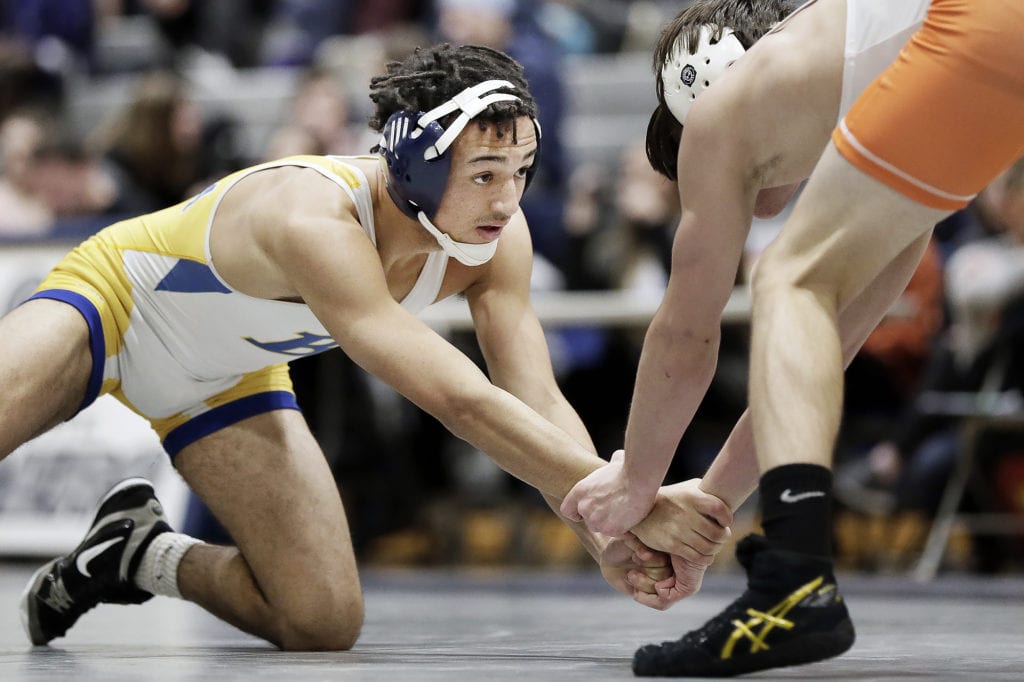
CREDIT: ELIZABETH ROBERTSON/PHILADELPHIA INQUIRER/NEWSCOM
Maxwell and his assistants argued Drew’s case. After less than two minutes of discussion, Maloney turned his back on them and twirled his finger to start the 90-second injury clock. When it ran out, Drew would forfeit.
It didn’t take Drew long to decide. Wrestlers make immense sacrifices — running in rubber suits to cut weight, starving themselves, vomit-inducing practices. The whole team had suffered to beat Oakcrest. If Drew didn’t wrestle, and win, they could lose the meet and the division title. He did what any Buena wrestler would have done. “I’m going to cry, but cut it,” he told his coach.
As a trainer began to hack off fistfuls of locs with a pair of tape scissors, a wave of anguished noise rolled down from the packed bleachers. Shouts of “Noooo!” can be heard on the video.
Rosa did not run down to the mat. Neither did Sheridan. Later, they would be flamed on social media for not stepping in. But the situation was out of their hands. Would it have been less humiliating for Drew if his parents made him forfeit the match? How much hair would Drew have had left by that point? What could Rosa and Sheridan have done as the clock ticked down to zero?
When about half of Drew’s dreadlocks were gone, Maloney deemed him acceptable. Drew walked onto the mat with tears in his eyes, his face a mask of hurt and anger, breathing so hard his cheeks puffed out from his face.
Oakcrest’s David Flippen bloodied Drew’s lip in the first period. Watching the video, there are moments where Flippen’s hair flops past his eyebrows, which is supposed to be illegal. Drew’s legs convulsed with cramps. With less than a minute to go in the match, Flippen was on top of Drew, leading 2-1. Drew escaped, earning one point to tie the match. He was poised on top of the wall. Sudden-death overtime: The first wrestler to score again would win.
Less than a minute into the overtime, Drew emerged from a tangle of limbs and took Flippen down. Maloney blew his whistle. Drew staggered upright, let Maloney briefly raise his right arm, then yanked it away and stumbled off the mat.
Buena won the meet and at the end of the season won the division with a 6-0 record. Oakcrest finished 5-1.
Forty-five minutes after the match, Drew sat in a hallway, tears streaming down his face. Rosa massaged his trembling legs. He had broken down the wall. But another was rising in its place.
In the days after the video detonated on social media, reporters circled the high school. TV trucks parked outside the Johnsons’ house, right up to Christmas Eve. Sheridan, a cable TV equipment installer, and Rosa, an elementary school teacher in the Buena district, were deluged with comments, ranging from well-intentioned to overbearing to hurtful.
Man, Drew is a trouper. Glad he’s done with all that stuff. … What’s the big deal? … It’s just hair, it’ll grow back. …
Drew sat in his classes in a daze. He walked the halls with his headphones clamped tight. With his new celebrity supporters and fame, he felt yanked from euphoria to anger to depression. One day he left the wrestling room and walked past a basketball game. He felt every eye in the gym on him as he left the building.
Buena’s next match was canceled, with no clear explanation given. The match after that, the referee called the school and said Drew’s hair was still illegal. That match was canceled too. Now the whole team was being penalized. Nobody wants to suffer through making weight for nothing. Drew struggled with whether the canceled matches were his fault, and whether he should quit the team.
He decided against it. He was a varsity starter. The team needed him. Who knows what foolishness Nate would get into in practice without Drew. And if you mess around in practice, the matches will be hell.
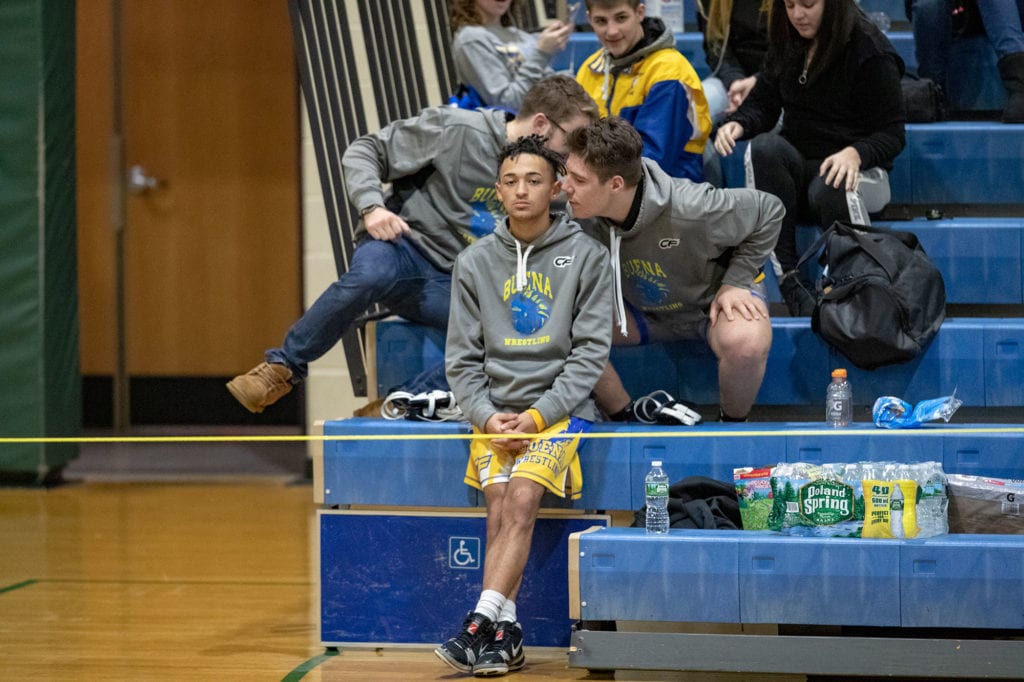
CREDIT: ANDREW MILLS/NJ ADVANCE MEDIA/BARCROFT MEDIA
Most of all, Drew just wanted to wrestle.
He got pinned in the two matches after his hair was cut, then recovered to win eight in a row at the end of January. He did well enough at the district meet to qualify for regionals but lost in the first round and ended his season with a 19-10 record and eight pins. Nate finished 21-7 with 15 pins.
The Johnson family has made no public comment since a statement six days after the December match.
“Wrestling has taught Andrew to be resilient in the face of adversity,” Rosa and Sheridan said in the statement. “As we move forward, we are comforted by both the strength of Andrew’s character and the support he’s received from the community. We will do all that we can to make sure that no student-athlete is forced to endure what Andrew experienced.”
There is a long history of white people trying to legislate and regulate the gravity-defying, shape-shifting glory of black hair. White people may think their rules are neutral, but they come from a mindset that, consciously or not, defines white hair as normal and black hair as deviant. Black hair must be controlled, conform or cut down. Its mere existence is often seen as illegal, from a North Carolina pool banning swimmers with locs to a Texas junior high school coloring in a boy’s part with a Sharpie.
Maloney has a horseshoe of dark hair around the sides of a bald scalp. He is 63 years old, about 5 feet, 7 inches tall, with a paunch and an outsize reputation built on four decades of refereeing in South Jersey. He has held several offices in the New Jersey Wrestling Officials Association, or NJWOA.
Maloney is an extremely knowledgeable official but also abrasive, frequently late to matches and a showboat, according to three wrestling coaches I spoke with and other coaches interviewed by NJ Advance Media. What the coaches didn’t need to tell me, because it received statewide media coverage, is that Maloney once called a black referee the N-word. Maloney was briefly suspended, but his punishment was overturned by the NJWOA.
All this history set the context for Maloney calling Drew’s hair “unnatural.”
The New Jersey State Interscholastic Athletic Association (NJSIAA) follows the wrestling regulations of the National Federation of State High School Associations. The rulebook says that “the hair, in its natural state, shall not extend below the top of an ordinary shirt collar in the back; and on the sides, the hair shall not extend below earlobe level; in the front, the hair shall not extend below the eyebrows.” In a photo of Drew’s hair just before the match, he did not violate any of those restrictions.
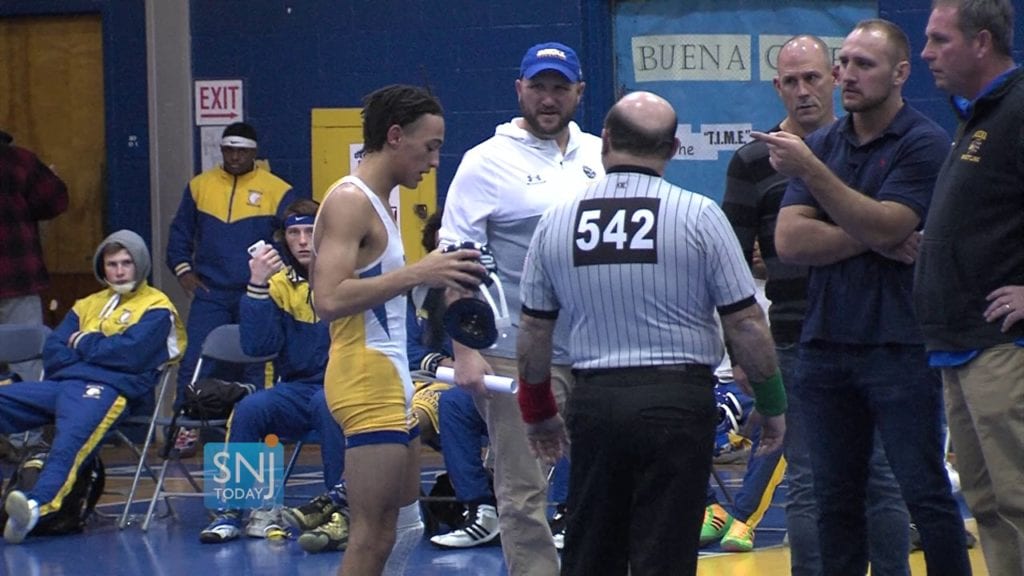
Amid the postmatch outrage, the NJSIAA and NJWOA agreed not to assign Maloney to any more matches until an investigation was completed. Three weeks later, Roy Dragon, who holds offices with both organizations, sent an email to NJWOA chapters to clarify the hair rules.
Dragon’s email tried to outlaw the hair that Drew still had left. The email, which was obtained by NJ Advance Media, showed examples of what it called illegal hair that required a cap, including this photo.
But the hair in the photograph was actually legal, according to the National Federation of State High School Associations. Asked by local media about that contradiction, NJSIAA executive director Larry White sent out another email, which included this guidance from the national rules federation:
“There is a wide spectrum of modern hair styles that might give the appearance that they are in violation of the hair rule, but in actuality they are just creative expressions of today’s youth,” the guidance said. It defined hair in its natural state as “how your hair appears when you wake up in the morning.”
But that still leaves room for judgment about what is “natural.” Can you wrestle with hair dyed orange? With gelled hair?
Can the people who run South Jersey wrestling recognize their assumption that everything white is normal and anything else needs to conform or get cut down?
It’s false to say that mixed-race people are caught between two worlds, but it’s a fact that the reaction to Drew’s haircut placed the Johnsons in a bind.
The support Drew received, locally and beyond, helped him and his family get through the experience. Filmmaker Ava DuVernay tweeted, “I don’t just wear locs. They are a part of me … So to watch this young man’s ordeal, wrecked me. The criminalization of what grows from him. The theft of what was his.” New Jersey Gov. Phil Murphy said he was “deeply disturbed.”
But many supporters focused their outrage on Drew’s coaches, teammates, trainer, school and neighbors. “Why didn’t people as a group walk out of that room? It speaks to the culture that this is acceptable,” Rachel Green, a member of the civil rights group Action Together New Jersey, said at a public meeting called by the school district. Action Together called for racial bias training for the entire Buena district.
In a passionate Twitter video, four-time world champion and Olympic gold medalist Jordan Burroughs, who grew up 15 minutes from Buena and attended the same high school as Maloney, told Drew: “The fact that the parents and the coaches in that gymnasium allowed for you to be put in that position and didn’t protect you is absolutely shameful.
“The bottom line is this young man, especially a young black man in a traditionally and predominantly Caucasian sport, out there defenseless, you guys gotta help this young man. You gotta protect him,” Burroughs said. He criticized Maloney — “You gotta pay the consequences of your actions” — and later FaceTimed with Drew to offer more support.
Drew’s coaches did argue on his behalf. The trainer reluctantly did what Drew asked her to do. Drew wasn’t thinking about systemic racism when Maloney started that 90-second clock. He was thinking about a division title.
And yet …
Buena can be uncomfortable for people of color. It’s one of 53 New Jersey towns that voted for Donald Trump in 2016 after choosing Barack Obama in 2012. There is prejudice against Mexicans who come for agricultural work. Since Trump was elected president, a few Confederate flags have been spotted flying from pickup trucks at Buena high school football games.
“Buena is no different than most of the communities around here,” said the Rev. David Mallory, the black pastor of First Baptist Church in adjacent Richland. “There are still racial tensions in a lot of areas, but I also see more interracial activity that is favorable.”
Since Drew’s hair was cut, much of Buena has assumed a defensive crouch. Many residents don’t want to acknowledge the role of race in what happened to Drew.
“Ambivalence toward racism is a form of racism in itself,” Speziali told me.
Rosa and Sheridan grew up in Buena and enjoy living there, have meaningful friendships among people of all races and never told me anything negative about their home. But it was clear to me that Buena could become an inhospitable place if they spoke publicly about the toll Drew’s humiliation took on their family.
The uproar over Drew’s hair “upset me because it became a racial issue. Buena is a melting pot,” said one resident who is close to the Johnson family. The woman, who is white, did not want to be named in order to avoid upsetting the Johnsons. “My boys were brought up not to judge people based on color. We have all types of kids staying over at our house. We’re just a little town, as far from racist as possible.”
Well, maybe not that far.
“There’s a few racists, like anywhere else,” she continued. “But we’re family.”
A three-minute drive from The Line Up, inside the Sports Cuts barbershop, owner Frank Baldissero rings up haircuts on a 1950s-era R.C. Allen cash register. A 1932 photograph of Rockefeller Center skyscraper workers eating lunch in midair hangs on the wall. A grease board has customer appointments written into 15-minute time slots. “That’s my computer,” said Baldissero, who has been here 31 years.
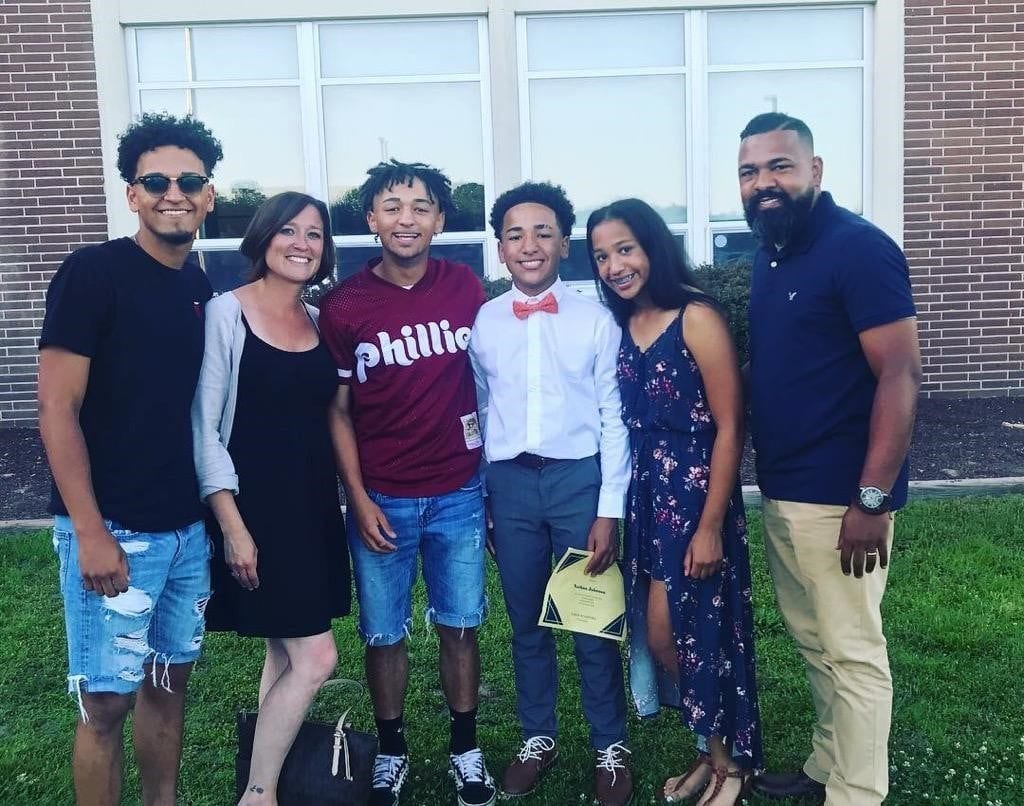
Johnson Family
At Sports Cuts, Maloney is the hero and the Johnsons are villains. “The kid got away with it for some number of matches and finally got a ref who followed the rules,” said Baldissero, whose head matches his name. “They didn’t enforce the rules until that point in time, and that’s it.”
“The media left out that no adults or coaches made him follow the rules,” chimed in Katrina D’Allessandro. Her son Will was getting his hair cut for the prom, a fade with bangs hanging down over the front.
“It was upsetting to a lot of people at school,” Will said. “Buena isn’t a racist school. We’re all diverse, we have different views. We’re all human. It’s just a matter of rules, I guess. The rules are that hair has to be a certain length. You can’t really have dreads.”
“The parents and the kid, they should step up and say this isn’t about race, it’s about rules. The kid didn’t follow the rules,” said Baldissero.
“The media is way out of whack,” the barber continued. “They turned it into a racial thing. It got to be a racial thing based on what the ref did years ago. People change. I’m sure he’s not the same person he was back then.”
What Maloney did “years ago” happened in 2016, during an informal gathering of referees after they worked a Jersey Shore tournament. During a disagreement about homemade wine, Maloney poked a black referee named Preston Hamilton in the chest and called him the N-word. Hamilton, a former wrestler, responded by body-slamming Maloney.
The NJWOA was asked to discipline Maloney, who was NJWOA membership chairman and training supervisor at the time. He apologized to Hamilton and volunteered to take alcohol awareness and sensitivity courses. The NJWOA ethics committee decided that Maloney should be suspended from refereeing for one year. The committee also suspended Hamilton for “assault.”
Both men appealed. Ethics appeals are handled by NJWOA officers, several of whom had been friends with Maloney for decades. They voted to rescind both suspensions, outraging a swath of the South Jersey wrestling community. Numerous schools told the NJWOA not to assign Maloney to their meets.
Maloney wasn’t interested in public contrition. “I really don’t think this should go any further than it’s gone anyhow. … It was two men, a group of guys, having fun and it was just a slip-up. If you can’t see past that, then I don’t know what to say. I made a mistake and I apologized for it,” he told the Courier-Post newspaper.
It was not his first mistake. In 2012, Maloney told a 6-year-old wrestler that he couldn’t compete with dreadlocks because “hair doesn’t naturally look like that,” according to a statement by a parent who came forward to state civil rights investigators after Drew’s haircut. Finally, “a younger referee, who was a person of color, told him that my son’s hair was natural and he was able to wrestle with it,” according to the statement, which was obtained by NJ Advance Media. Maloney also was accused of kicking an 11-year-old mixed-race wrestler after he wandered onto the mat during a match.
Maloney owns an auto repair garage in West Berlin, about 30 minutes north of Buena. I stopped by one afternoon in May and walked around the gray building with three car bays. A police car was up on one lift. I asked a mechanic if Maloney was around, and he went to get him.
I waited in the garage’s tiny office. Several NJWOA awards hung on the wall. “Presented in recognition for your outstanding achievements, leadership and contributions to New Jersey Scholastic Wrestling,” read one faded plaque. Nearby was a framed newspaper article from Maloney’s 1989 induction into the South Jersey Wrestling Hall of Fame. The pinnacle of his competitive career was finishing fourth in the state in 1974. He started reffing two years later.
A short white man with a cigar jammed into his mouth entered the office. He was not Maloney. “Who’s calling?” the man asked. I told him.
“You have to leave,” the man said, and pointed at the door.
Maloney has filed a legal notice preserving his right to sue the Buena school district and 11 other possible defendants, not including the Johnson family. He is claiming defamation of character and emotional distress.
Mikey Morales spun Drew around in his barber chair and went to work on what was left of Drew’s dreadlocks. Hair fell to the floor, just like on the mat four months earlier. Only this time, Drew was reclaiming his identity as a mixed-race, bighearted athlete in a small town that doesn’t fully understand what it means to be Drew Johnson.
Drew had played baseball as a sophomore but decided not to go out for the team this past spring. He did go to the prom. He got an after-school job busing tables. Last summer, he worked on a farm during tomato harvest and received an all-expenses-paid scholarship to attend Burroughs’ wrestling camp in Nebraska. Nate went to the camp too. Drew is looking forward to wrestling his senior year with Nate. Their bond is closer than ever.
The civil rights division of the state attorney general’s office is investigating the incident, along with the NJSIAA. Their findings will determine whether Maloney will referee again.
Thanks to the publicity over Drew’s hair, other dreadlocks will thrive. California just banned employers and schools from discriminating against people based on their hair. A similar bill is pending in New Jersey.
Maloney saw Drew as another black boy who should have followed the rules. Now rules are changing because of Drew.
Morales snapped off his clippers. Drew looked at himself in the mirror. The sides of his hair were faded close to his scalp. A low carpet of hair lay on top. From the crown grew one last dreadlock, uncut, in its natural state, with inseparable strands of Africa, Europe, the Caribbean, and the United States of America.


